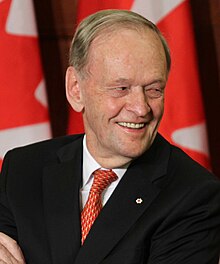Jean Chrétien
Joseph Jacques Jean Chrétien OM , CC , PC , QC (born January 11, 1934 in Shawinigan , Québec ) is a former Canadian politician. He was Prime Minister of Canada from November 4, 1993 to December 12, 2003 for the Liberal Party of Canada .
Career
After suffering from Bell's palsy in his youth , the left side of his face is paralyzed. After graduating from high school, he studied law in Québec at Laval University .
He began his political career when he was elected to the Canadian House of Commons in 1963. In 1966 he became State Secretary in the Treasury. In 1968 Chrétien was first promoted to Minister for Tax Assessment and Tax Revenue and in the same year to Minister for Native American Affairs and the Northern Territories. Chrétien became head of the treasury in 1974, trade minister two years later, and then finance minister in 1977. In 1980 he moved to the cabinet in the justice department. During his tenure as Attorney General, Chrétien played a key role in negotiating the adoption of Canada's Constitution . In 1982 he changed departments again to take up the post as Minister for Energy, Mining and Natural Resources.
The first major career dip came in 1984 when Pierre Trudeau announced his resignation from the chairmanship of the Canadian Liberal Party. Chrétien ran together with John Turner for the vacant party chairmanship, only to lose in the second ballot. Turner appointed Chrétien Foreign Minister and Deputy Prime Minister, but the relationship between the two was tense. So in 1986 Chrétien gave up all offices and announced that he wanted to retire from public life. However, when Turner gave up the party leadership in 1989, Chrétien reported back to fight again for the party leadership. In June 1990 he defeated Paul Martin at the Liberal Congress in the first ballot. He also moved back into the House of Commons in the same year.
prime minister
In October 1993, the Liberal Party won the general election with a large majority, so that Chrétien became Prime Minister and his predecessor Kim Campbell replaced the Conservative Party. He was confirmed in office in 1997 and 2000.
Chrétien saw it as one of the main tasks in his service to prevent the threatened separation of Québec from the Canadian motherland. In the referendum of 1995, the majority of the people of Québec voted against independence. However, this majority was relatively small, so that Chrétien passed a law to make provincial independence more difficult. Canadian juvenile criminal law has also been fundamentally reformed. He also campaigned for the legalization of marijuana, which he could not enforce.
Canada, under Chrétien's aegis, did not support the invasion of Iraq by the US-led coalition troops in 2003. Canada, however, together with Germany , has the largest military contingent at ISAF in Afghanistan , which Chrétien advocated.
Resignation and retirement
In 2002, Chrétien was in danger of not being re-elected party chairman. In order to avoid the threat of defeat, he said that he would not run again for party chairmanship and would give up the post of prime minister in January 2004. In December 2003, Paul Martin was elected the new Prime Minister by the House of Commons.
Chrétien is now still working as a lawyer. He has been married since 1957. He has two sons and a daughter.
See also
Web links
- Jean Chrétien - biographical information on the website of the Canadian Parliament (English)
| personal data | |
|---|---|
| SURNAME | Chrétien, Jean |
| ALTERNATIVE NAMES | Chrétien, Joseph Jacques Jean (full name) |
| BRIEF DESCRIPTION | Canadian politician |
| DATE OF BIRTH | January 11, 1934 |
| PLACE OF BIRTH | Shawinigan |

